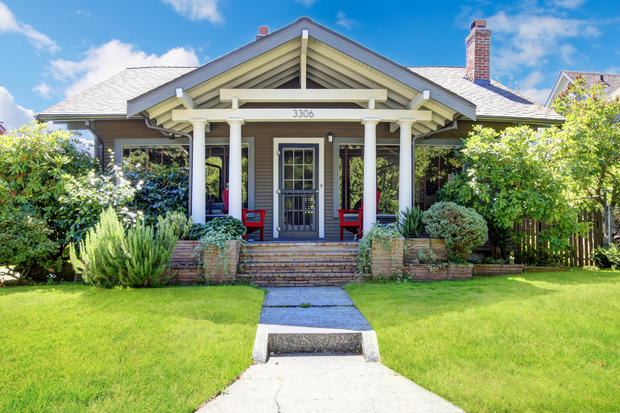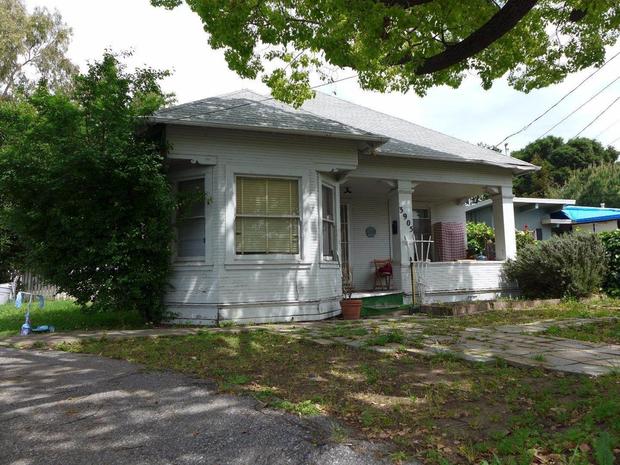Millennials struggling to put a roof over their heads
House-hunting? Here's hoping it's not your first.
The U.S. housing market is dogged by what the National Association of Realtors calls a "troubling shortage of homes," with tight inventories, particularly in the market for entry-level homes, driving up prices. That's making it harder for millennials who have had to shack up with their parents in wake of the recession to find a place of their own.
"Young adults may have to find multiple roommates or else live with their parents," predicted NAR Chief Economist Lawrence Yun. He pinpointed the trend in 2015 when rents rose at their highest pace in seven years, and home prices nationally increased by 6 percent -- three times that of the average wage growth.
Since then, the housing market has become more competitive, with a dearth of lower-priced properties. The so-called months of supply, a key number that tells realtors how long it will take for homes on the market to sell, has recently declined to 4.5 months, from an average of 4.8 months in 2015. The normal expectation is six months.
RealtyTrac, which provides housing data, said that in March homes sold for $30,500 more than they were purchased for, a 17 percent average boost in price and the highest price gain for sellers in any month since December 2007 -- the onset of the Great Recession. More than a third of the metro areas analyzed reached an all-time peak.
The monthly Case-Shiller report shows the hot-spots, many of them in booming western cities, where prices have jumped the most. Both Portland and Seattle posted double-digit yearly price growth this past February, with Dallas, Denver and San Francisco close behind. According to the NAR, the median sale price for existing homes in March was $222,700, up 5.7 percent from a year ago.
The upshot: First-time home purchasers should prepare themselves for sticker shock. Real-estate data provider Trulia advises prospective buyers in the market for a median-priced starter home ($100,000-plus) to plan on dedicating 37.7 percent of their income to the purchase, up from 32.2 percent just four years ago.
"Those just starting out or making their first foray into homeownership are worse off than they've been in years," Trulia economist Ralph McLaughlin said in a blog post. "There are fewer homes available, and even if they can find a home, it's likely to be more expensive."
So what led to this squeeze? One major factor is tear-downs. With abandonments and foreclosures, a total of 1.7 million housing units were deemed uninhabitable and demolished since 2009, according to the NAR. More than three times that many were built, but it hasn't kept pace with the 17.3 million more people who want living space.
Investors, including hedge funds, also jumped in during the recession with cash and bought up many homes, turning them into more profitable rental units.
"Increased supply is definitely needed," Yun said.
But many cities and towns don't understand just how severe the crisis is and continue to hike local development fees in an effort to boost revenue. Local factor, as always, also continue to play a role.
In the always tight New York City housing market, Jack Bick, founder and broker of S. Charatan Realty, said Mayor Bill DeBlasio's efforts to increase affordable housing have actually led to a slowdown as developers say they can't earn enough on new high-rise construction.
Meanwhile, the upper end of the housing market, dubbed "premium" by realtors, has been going gangbusters, sustaining such high prices that people who might have left starter or mid-range homes aren't trading up.
Will things get better? Higher prices will probably motivate more sellers, and if interest rates stay low it will encourage more people to take mortgages. Keefe, Bruyette & Woods analyst Brian Gardner said in a recent client note that banks have eased lending standards on most types of residential mortgage loans.
On the flipside is the threat of a Federal Reserve interest rate hike, which would force banks to lift mortgage rates and might also provide better returns for investors outside the housing market.
But for right now, the trend is toward higher prices and limited supply. That leaves young people looking toward the future with two problems -- finding a job and a home.

